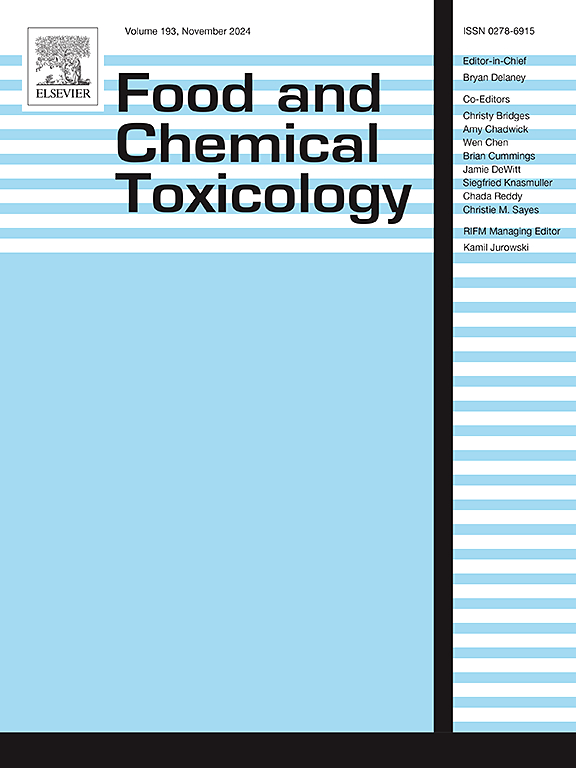Renoprotective effect of berberine in cisplatin-induced acute kidney injury: Role of Klotho and the AMPK/mtor/ULK1/Beclin-1 pathway
IF 3.5
3区 医学
Q2 FOOD SCIENCE & TECHNOLOGY
引用次数: 0
Abstract
Cisplatin (Cisp) is a potent cancer drug, but its use is limited by acute kidney injury (AKI). Autophagy, a process that removes damaged proteins and maintains cellular homeostasis, has been shown to alleviate Cisp-induced AKI. The balance between autophagy and apoptosis is crucial to kidney protection. Treatment with Berberine, known for its antioxidant and anti-inflammatory effects in nephrotoxicity models, was studied for its potential to enhance autophagy in Cisp-induced AKI.
Treatment with Berberine (Berb) upregulated Klotho gene expression, enhancing autophagy as indicated by elevated protein levels of pS486-AMPK, pS638-ULK1, and Beclin-1, accompanied by a decrease in pS248-mTOR protein expression. Also, Berb mitigated oxidative stress by reducing elevated MDA levels and boosting SOD activity, which in turn suppressed inflammation by down-regulating HMGB1 and RAGE gene expression, as well as reducing pS536-NF-κB and IL-6 protein contents. Additionally, Berb reduced apoptosis by increasing Bcl-2 and decreasing Bax. This coordinated action preserved kidney function, evidenced by reductions in early injury markers (cystatin C, KIM-1, NGAL) and late markers (creatinine, BUN), along with attenuation of histopathological alterations. The use 3-MA, autophagy inhibitor, nullified these protective effects, highlighting Berb's role in promoting autophagy, reducing oxidative stress, inflammation, and apoptosis, and preserving renal health in Cisp-induced AKI.
小檗碱在顺铂诱导的急性肾损伤中的肾保护作用:Klotho和AMPK/mTOR/ULK1/Beclin-1通路的作用
顺铂(Cisp.)是一种有效的抗癌药物,但其使用受到急性肾损伤(AKI)的限制。自噬,一种去除受损蛋白和维持细胞稳态的过程,已被证明可以减轻cisp诱导的AKI。自噬和细胞凋亡之间的平衡对肾脏保护至关重要。小檗碱在肾毒性模型中具有抗氧化和抗炎作用,研究了其在cisp诱导的AKI中增强自噬的潜力。小檗碱(Berberine, Berb)可上调Klotho基因表达,增强自噬,pS486-AMPK、pS638-ULK1和Beclin-1蛋白水平升高,同时pS248-mTOR蛋白表达降低。此外,小檗通过降低MDA水平和提高SOD活性来减轻氧化应激,从而通过下调HMGB1和RAGE基因表达以及降低pS536-NF-κB和IL-6蛋白含量来抑制炎症。此外,小檗通过增加Bcl-2和降低Bax来减少细胞凋亡。这种协同作用保留了肾功能,早期损伤标志物(胱抑素C、KIM-1、NGAL)和晚期标志物(肌酐、BUN)的减少以及组织病理学改变的减弱证明了这一点。自噬抑制剂3-MA的使用抵消了这些保护作用,强调了小檗在cisp诱导的AKI中促进自噬、减少氧化应激、炎症和细胞凋亡以及保持肾脏健康方面的作用。
本文章由计算机程序翻译,如有差异,请以英文原文为准。
求助全文
约1分钟内获得全文
求助全文
来源期刊

Food and Chemical Toxicology
工程技术-毒理学
CiteScore
10.90
自引率
4.70%
发文量
651
审稿时长
31 days
期刊介绍:
Food and Chemical Toxicology (FCT), an internationally renowned journal, that publishes original research articles and reviews on toxic effects, in animals and humans, of natural or synthetic chemicals occurring in the human environment with particular emphasis on food, drugs, and chemicals, including agricultural and industrial safety, and consumer product safety. Areas such as safety evaluation of novel foods and ingredients, biotechnologically-derived products, and nanomaterials are included in the scope of the journal. FCT also encourages submission of papers on inter-relationships between nutrition and toxicology and on in vitro techniques, particularly those fostering the 3 Rs.
The principal aim of the journal is to publish high impact, scholarly work and to serve as a multidisciplinary forum for research in toxicology. Papers submitted will be judged on the basis of scientific originality and contribution to the field, quality and subject matter. Studies should address at least one of the following:
-Adverse physiological/biochemical, or pathological changes induced by specific defined substances
-New techniques for assessing potential toxicity, including molecular biology
-Mechanisms underlying toxic phenomena
-Toxicological examinations of specific chemicals or consumer products, both those showing adverse effects and those demonstrating safety, that meet current standards of scientific acceptability.
Authors must clearly and briefly identify what novel toxic effect (s) or toxic mechanism (s) of the chemical are being reported and what their significance is in the abstract. Furthermore, sufficient doses should be included in order to provide information on NOAEL/LOAEL values.
 求助内容:
求助内容: 应助结果提醒方式:
应助结果提醒方式:


